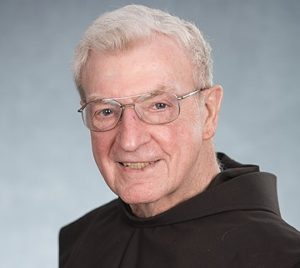
Readings:
First Reading: 2 Sm 7:1-5, 8b-12, 14a-16
Responsorial Psalm 89:2-3, 4-5, 27, 29
Second Reading: Rm 16:25-27
Gospel: LK 1:26-38
Advent and Christmas are seasons filled with stories. They tell the story in many forms: baroque Christmas concertos, religious hymns and popular Christmas carols, literary masterpieces by Dickens (A Christmas Carol) and O’Henry (The Gift of the Magi), medieval plays and modern opera (Amahl and the Night Visitors), Renaissance paintings of the Annunciation, Madonna and Child, and the adoration of the magi, simple children’s stories, songs, and rituals (gift-bearers St Nicholas, Santa Claus, Befana), the little drummer boy, and especially the Christmas cribs. Cribs owe their inspiration to St. Francis of Assisi, who set up a simple nativity scene of live ox and donkey, and manger with straw in a cave outside Greccio in the early thirteenth century, so he and local townsfolk could see with their own eyes the poverty and self-giving love of the newborn Christ. Cribs have gradually developed into many forms: with sculpted images, nativity sets including local townsfolk, and living nativity scenes played by young children.
These are all winsome and gentle ways to remember the story of Christ’s birth and to delight in telling it again and again. His life from birth to death has been called ”the greatest story ever told.” But we are not the first story-tellers. God is. We love stories because God loves stories and we are “created in God’s own image . . . and God found it very good” (Gen 1:27, 31). The story God tells is a much larger story, an epic as grand as the universe itself, yet as tiny and delicate as the smallest subatomic particle.
We get a first clue in today’s second reading. It begins to lift the veil on God’s “mystery kept hidden from long ago” (Rm 16:25). Not a mystery novel, but something much more wonderful. God has a secret plan, a dream. God did not need creation; rather, God loved all creation into being. God graciously shared the gift of existence and life out of love. God is love (1 John 4:7-10). God does not selfishly hoard that love, it must be given away (Ad Gentes, 2).
The wonder and beauty of this vast universe tell us something else about God. Creation also revealed something of God’s secret, that God loves beauty (Wisd 13:5; Rm 1:19-20). And there is yet more to be revealed. God could not keep that love selfishly hidden between the three Persons. God wanted to have a creature who could freely return that love as fully as possible. The Incarnation was what God dreamed of from the beginning and wanted most of all, according to medieval Franciscan theology. That human lover would also need to share love with others like itself. They would require a habitat with sunlight, water, air, and food to sustain life. God loved all that is into being, to share life and love.
The first reading gives us another clue to God’s grand design (2 Sm 7:1-16). When David thought to build a house for God, God turned the tables on him. Through the prophet Nathan, God let David know that he would provide “a place for his people Israel” and a descendent of the “house of David” in whom David’s “house and kingdom shall endure forever.” “I will be a father to him and he shall be a son to me” (2 Sm 7:5-14). The promised “revelation of the mystery kept secret for long ages now manifested through the prophets” (Rom 16:26) would soon reach fulfillment in a new covenant, like the covenant at Sinai and all those that preceded it throughout God’s great epic. From the creation of nature on, God’s plan has favored relationships, from the entanglement of subatomic particles, to flocking and gathering together of fish, flora and fauna, to human community. God loves things in community; God is a God of the group.
The gospel reading (Lk 1:26-38) brings God’s story to completion. “When the fullness of time had come, God sent forth the Son . . .” (Gal 4:4). The Angel Gabriel came to Mary to announce: “The Holy Spirit will come upon you, and the power of the Most High will overshadow you. Therefore the child to be born will be holy, the son of God” (Lk 1:35 ). To Mary’s puzzlement, the angel responds with the assurance, “nothing will be impossible for God” (Lk 1:37). In keeping with her Jewish heritage of seeking always to do the will of God, Mary simply replies “May it be done to me according to your word” (Lk 1:38). The final act in the accomplishment of God’s great plan, the Christ mystery, is the greatest gift of all, God’s very self. From the very beginning, it has been God’s plan and power that has accomplished the story and work of salvation, something impossible for us to achieve.
Is that where the story stops? Or is there a sequel? Several of times Jesus told his disciples: “as the Father has sent me, so I send you” (Jn 20:21). He charged us to carry on his work of spreading the news of God’s love, forgiveness, peace, and compassion. We first received that charge when we were baptized into Christ, into his own mission as prophet, priest, and king. We again accept that charge at every celebration the Eucharist, the repeatable part of the three sacraments of initiation. We are sent forth from the celebration again and again to be silent witnesses and co-workers with Christ in the work of salvation. That is the noble calling and supreme life task of every disciple.
Why not join Mary’s fiat today and especially tomorrow when we’re sent forth from Mass into mission? Just as the Incarnate Word is the face of God’s love and compassion to us, so are we the face of Christ to our world. How else can people see him now?
Gil Ostdiek, OFM
Professor of Liturgy